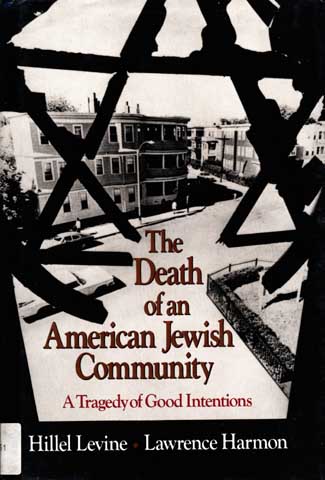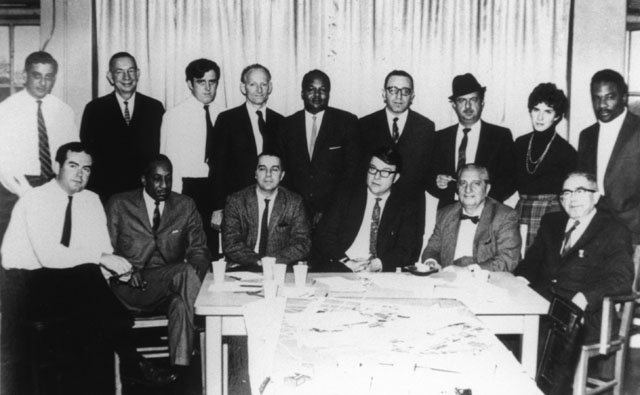
| The Bet Din (continued) |
 |
Joseph Korff explained his father’s dedication to the Bet Din:
"My father took the most pride in the things he got involved with during the mid-to-late 1960s and early 1970s. As the driving force behind the Bet Din, he led a precedence-setting settlement in a landlord-tenant dispute. It started with Israel Mindick and his brothers, Joseph and Raphael, Jewish landlords who were having a dispute with their minority tenants in Boston's South End. The Mindicks were the largest landlords in the South End and they consistently refused to make repairs on their properties. Rabbi Judea Miller, a Reform rabbi from Malden connected with the Civil Rights movement, learned that the Mindicks' Black and Hispanic tenants planned to picket the Mindicks' Orthodox synagogue. By promising to participate in the protest, Miller was able to convince the demonstrators to picket in front of Israel Mindick's home instead of the synagogue.
"Miller approached my father, explained that the landlords were creating an interfaith disaster, and asked him to conduct a Bet Din. My father wasn't convinced that this was a Jewish issue. Then Miller revealed that the Mindicks had set up dummy corporations and named them for the words in the final verse of Psalm 19: Yihiyu, Leratzon, Inrei, Fee, Vehegyon, Leebee, Lifaneha, Hashem, Tzuri, Vigoali (May the words of my mouth and the meditations of my heart be acceptable before You, O Lord, my rock and my redeemer.) My father agreed to take the case and the tenants agreed to argue their case in my father's court. The Mindicks reluctantly agreed to appear, for to be in contempt of the Bet Din meant shunning by the Orthodox community.
"The ruling favored the tenants in general, and
it was binding arbitration. My father's example was credited as a key factor in
the establishment of the Boston Housing Court. This case achieved nationwide
attention and was reported in the Wall Street Journal and other places.
 |
In the book The Death of an American Jewish Community: A Tragedy of Good Intentions, authors Hillel Levine and Lawrence Harmon described the rabbinic court proceedings:
"For the better part of the summer, the rabbis heard testimony from the tenants and landlords...The tenants recited familiar ills of exorbitant rents paid for substandard dwellings crawling with rats and roaches. The Mindicks countered that they could hardly be expected to take responsibility for tenants who threw garbage out of windows and damaged apartments faster than one could hope to repair them...
"Rabbi Korff never directly criticized the landlords, preferring instead to work through parable. A rabbi approached the door of wealthy man to seek a charitable donation, he told the Mindicks. The wealthy man's servant announced the rabbi and invited him inside. The rabbi, however, explained he would wait on the doorstep. The servant insisted that the rabbi come out of the cold, but the rabbi would not budge. Soon the wealthy man himself approached the rabbi and beseeched him to come inside for refreshment. ‘No,’ the rabbi insisted. 'You come outside. I want you to know what it feels like.' Israel Mindick suffered the long sermons in silence. Often, however, his lawyer would complain of the length of the proceedings. But Korff quickly quieted him, explaining that, there are times when divine providence requires great sacrifice.
"...The arbitration of social problems through ancient religious laws was unprecedented. National magazines and newspapers shared that view. On…the day scheduled for a final agreement between Mindick and his tenants, reporters from The Wall Street Journal, Look Magazine, and scores of others were on hand. The final agreement offered concessions to both tenants and landlords. The landlords agreed to repair, maintain, and paint the apartments in accordance with city codes. They also promised to provide adequate heat and hot water, daily janitorial service, more trashcans, and locks on all hallway entrances. The tenants, in turn, signed a pledge to help maintain the properties once repairs were in place and to drop their demands for private security guards at each building. The contract further stipulated a five-member board of arbitration to settle questions of overdue rents and other disputed claims...
"Suddenly a unique approach had been found for
the seemingly intractable problems between Jewish landlords and black
tenants...”
[1]
 |
|
Samuel Korff used the Bet Din to settle an ugly dispute between black tenants and Jewish landlords. |
Leonard Fein, a Brandeis University professor, described what took place the day the formal agreement was signed:
"The slum landlord in question, in a last burst of the self-pity which had marked his stance through much of the negotiation, pleaded to several of us that he was about to sign himself into bankruptcy. Why, he said, am I being penalized? All I've wanted was to put away a few dollars for my children. Is that so wrong?
"To which he was given the traditional answer, in the form of a question: What is more important, money or a good name? To this question, an observant Jew—and it was the fact that the man in question was an observant Jew that had made the entire proceedings possible—knows the answer. With an air of resignation, he signed the document--and truth to tell, there was a fair chance that he was, in fact, agreeing to bankrupt himself.
"When Rabbi Korff stood before the cameras to announce the agreement, he thanked the several people who had helped to engineer it. And then much to the surprise of those of us on the 'inside,' who had over the months become increasingly annoyed with the landlord, the good rabbi went on: In the end, he said, the fact that we have been able to bring these negotiations to a successful conclusion has been due to the extraordinarily sensitive and gentlemanly behavior of one man, a real prince among men, a decent and devoted and generous man, and one who deserves to be so recognized. I refer here to Mr. X (the landlord) [sic].
"I was stunned. Whatever one might have said about Mr. X. generosity of spirit was not his long suit, nor special sensitivity. I had not understood what Rabbi Korff had understood. He was giving Mr. X the good name he had promised him. It was a kind and decent thing to do." [2]
Despite, Rabbi Korff's phenomenal skill in obtaining such an unprecedented court ruling, the Mindicks made few improvements to their properties. According to Hillel Levine and Lawrence Harmon:
"Tenants in twenty of the brothers' buildings went on a rent strike that winter, charging that the landlords had failed to live up to the terms of the rabbinic court’s agreement. The rabbis concurred and slapped the Mindicks with a $48,000 fine to be distributed among the affected tenants...The Mindicks sold off thirty-four of their buildings to the Boston Redevelopment Authority, which placed them under the control of the South End Tenants Council for management and repair. The price of doing business in Boston, at least as far as the Mindicks were concerned, was growing much too steep." [3]
Joseph Korff described other ways in which Rabbi Samuel Korff influenced the rabbinical court:
"My father also guided the Bet Din in other areas not typically associated with rabbinical courts. This included an opinion by the Bet Din concerning the circumstances under which conscientious objection was permissible under Jewish Law. My father had been fairly active with the Hillel communities in the local colleges; one of his motivations was that he was interested in avoiding assimilation, intermarriage, and loss of Jewish identity. When the question came up about the role of conscientious objection in the Jewish religion, which was a very hot topic during the Vietnam War, he convened scholars and wrote a paper on conscientious objection and its role in Jewish philosophy. He built up a whole responsa showing why it was acceptable within Jewish philosophy. He received a decent amount of publicity, and positive feedback from the students.
"After that he was asked to deal with kashrut and health safety issues. He wrote a responsa on that. This included an opinion by the court concerning health standards in food preparation required by Orthodox rules.
"He constantly reached out to the Hillels[4] of the various colleges and supported them. He attempted to bring the religious principles with which he was imbued to a meaningful level within the Jewish college community which was composed of people from many different kinds of Jewish backgrounds."



[1] [2] [3]
[4] [5] [6]
[7] [8] [9]
[10]
[1] Levine, Hillel and Harmon, Lawrence, The Death of an American Jewish Community: A Tragedy of Good Intentions (New York: Free Press, 1992) pp. 191-193.
[2] Fein, Leonard. "In Appreciation of Rabbi Samuel Korff," The Jewish Advocate, Boston, December 26, 1974.
[3] Levine and Harmon. The Death of an American Jewish Community, p.193.
[4] Hillel is the largest Jewish campus organization in the world with 500 regional centers, campus foundations and student organizations. Its mission is to “maximize the number of Jews doing Jewish [activities] with other Jews. Hillel actively seeks to engage uninvolved Jewish students on their own terms to provide them with opportunities to do Jewish [activities] that are meaningful and appealing to them.” For more information, visit the Hillel web site at http://www.hillel.org/.